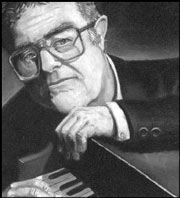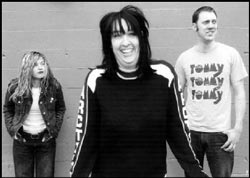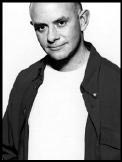THE EDUCATION OF RANDY NEWMAN
Act Theatre, 700 Union St., 206-292-7660, $10-$50. Pay-what-you-will matinee Sat., Oct. 26. Previews begin Fri., Oct. 18.
7:30 p.m. Sun. and Tues.-Thurs.; 8 p.m. Fri.-Sat.; 2 p.m. select matinees.
runs Thurs., Oct. 24-Sun., Dec. 1
RANDY NEWMAN’S music, equally steeped in Tin Pan Alley tradition and rock ‘n’ roll revolt, is by turns that of a caustic cynic and a starry-eyed romantic. It’s these shifting perspectives that have led his songs to be recorded by everyone from Elvis Costello to Barbra Streisand, yet among the several hundred artists who have covered his work, his own voice might still be the most unique to offer testimony to his status as one of the most gifted, if underrated, American songwriters of the past half-century.
Earlier this year, Rhino Records began the first part of an ambitious rerelease of Newman’s catalog, and in between a follow-up to his last new album (the brilliant Bad Love) and his role as one of Hollywood’s pre-eminent film composers —he finally earned his first Oscar this past March—he has taken time to focus his efforts on a relatively newfound passion: the theater.
Lifting its title from Henry Adams’ history of the early 1900s, The Education of Randy Newman uses a cast of seven (Newman does not appear) and the peculiar prism of Newman’s songs to trace his journey through the latter part of the 20th century—from his New Orleans roots to his success on the sun-blinded streets of Los Angeles. The show is an especially notable event for Newman devotees, as it boasts several unheard gems and a handful of specially written compositions.
On the eve of the play’s first Seattle preview, Newman spoke to the Weekly about his love for the theater, the rediscovery of his solo work, and what it’s like writing songs for Michael Jackson.
Seattle Weekly: Was The Education of Randy Newman something you’d been kicking around for a long time?
Randy Newman: It wasn’t my idea, really. There have been three or four different shows done based on my songs— revues mostly. But I believe this is the best one. When I wrote Faust [in 1995], I ended up enjoying the process a great deal. And people have always thought I should be writing for the theater or that my songs were theatrical.
How involved have you been in shaping the show since it debuted [in 2000 at the South Coast Repertory]?
The show has changed about 40 percent since it was done at SCR. I was up [in Seattle] for a week recently, and I wrote some new stuff for the show—a new song to open it, and two or three other songs, or fragments of songs, to connect things. So it’s changed a good bit since then.
I’d read where you said you’d worked on Faust for something like 18 months and didn’t see a dime out of it. Obviously, for you, theater is more a labor of love than anything else.
Oh, yeah. I can totally understand all that bullshit about the theater getting in your blood; there is something about it.
The thing about Faust was it played to people that would never come to see me in [concert]. Sixty-five-year-old women who didn’t even know my name really liked Faust. And I got a kick out of that. It was the most accessible thing I’ve done, I guess—although I’ve never felt my songs were that hard to understand, if you listen to ’em. It’s not physics.
Do you feel like this year you’re sort of being rediscovered?
Nah, I don’t think it works that way. It isn’t like where Schubert never [had] his work performed until he was dead, then he was “discovered.” I think I’m drawing better on the road, but maybe that’s from being on television—the Academy Awards or the Bravo [Musicians] thing.
Maybe it’s just that people are being reminded of your body of work. . . .
I hope so. You know, I was happiest with the last album. I felt it was about the best album I made—and that’s not the norm in rock ‘n’ roll. The norm is for people to do their best work very young, and then go into a steep decline [laughs].
Still, looking back on a song like “Political Science” [from 1972’s Sail Away]—that’s one that everyone points to as being especially relevant at the moment. It seems like your albums really haven’t dated that much.
I gotta admit, they hold up pretty well. But strange things hold up. You listen to a Donovan record now and it holds up. Who knew?
A few years back, you were asked to write some songs for Michael Jackson—one of those tunes, “Lullaby,” actually turns up in Education. Do you get those kinds of offers regularly?
No, never. That one was out of left field. I mean, if you want [a hit], you’d go to someone like Diane Warren before you’d go to me. I just don’t have that kind of track record.
It’s funny, my son called me the other day—he’s in the record business—and he said Shakira is making a record. And I thought, ‘Well, maybe I’ll try and write something for her.’ I’ve heard her album ’cause my little girl has it. I don’t know, that might be a good career move for me [laughs].









